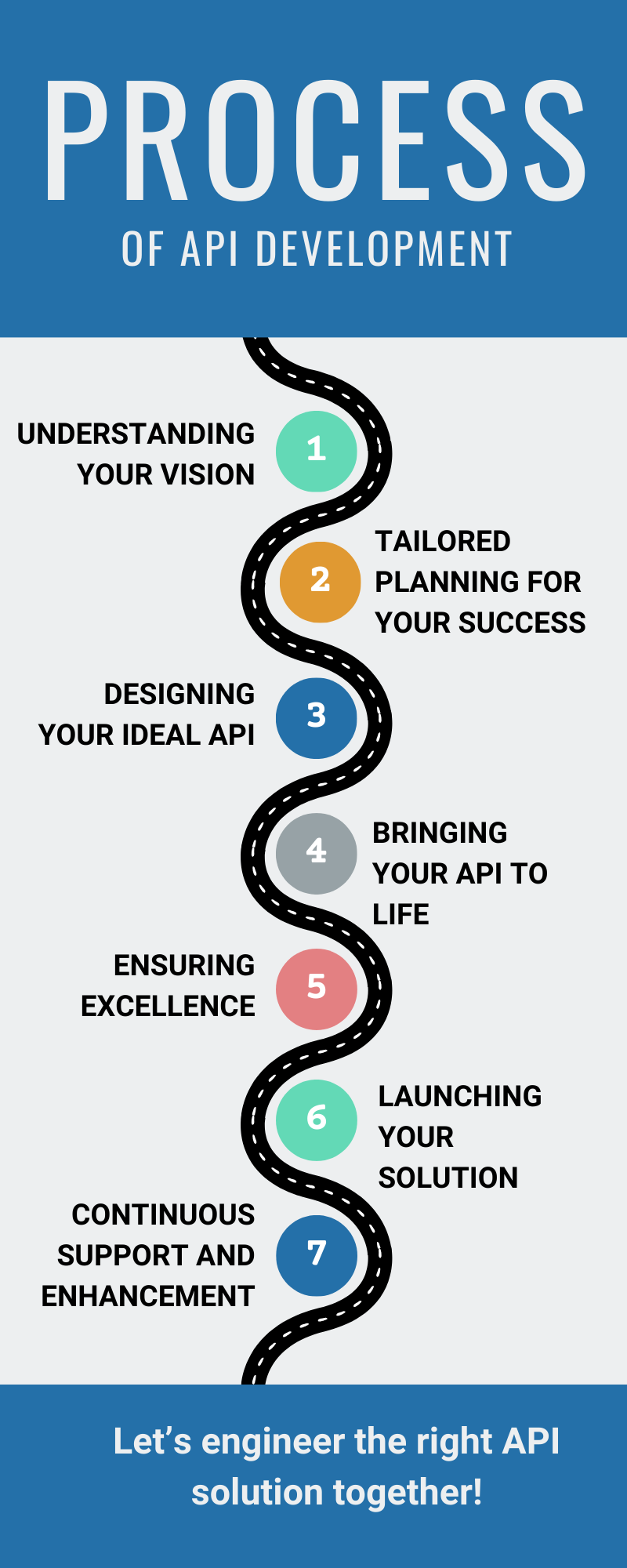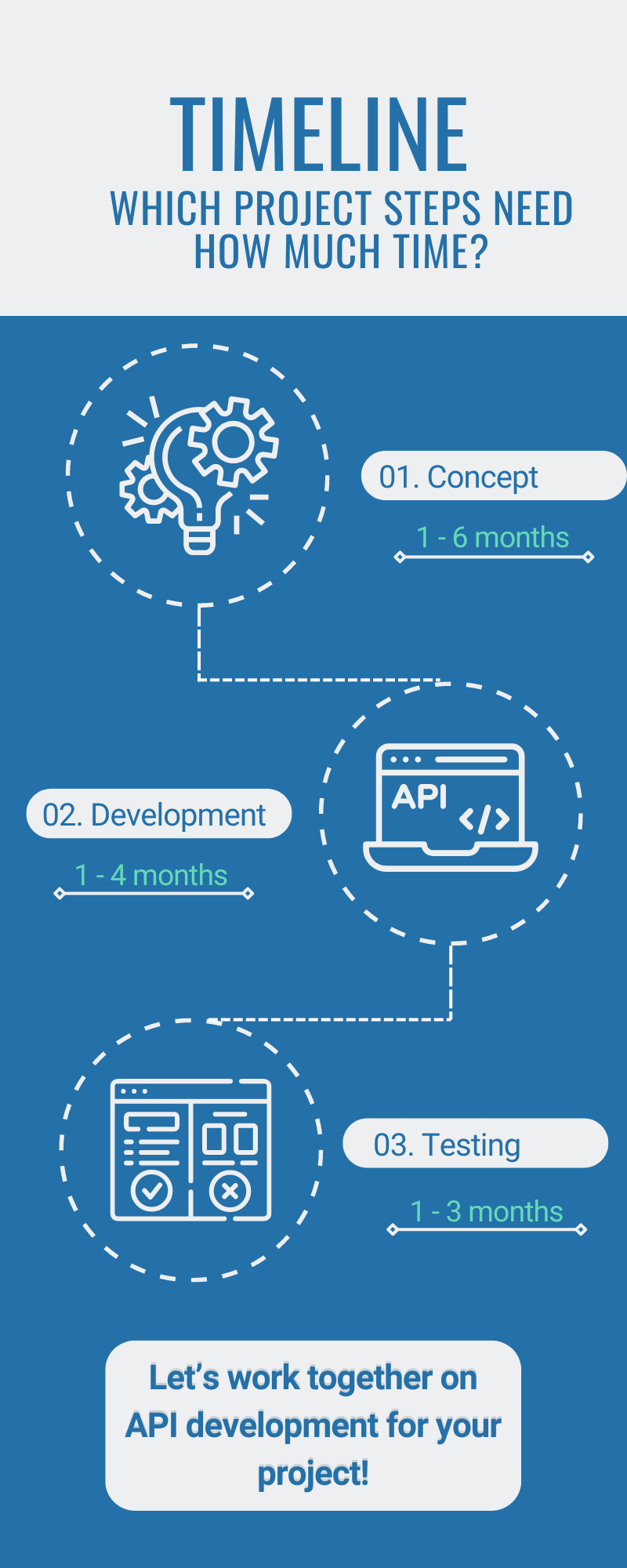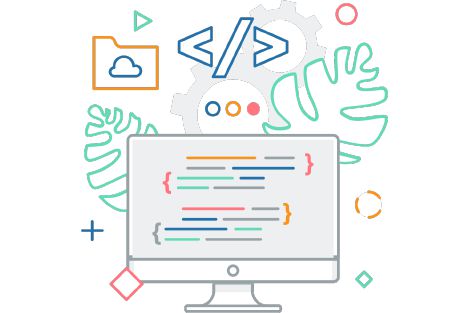API development services
Discover and implement an API-first strategy for your applications


Discover our API development and integration services
Figuring out the right architecture for your applications and then connecting all your different services with well working and well documented APIs can seem overwhelming at first. Don't worry though our team of experts is here to help you discovering the correct service and API strategy for your applications and will also help you with the implementation of the strategy.
What is API development and why is it important?
API development refers to the process of creating Application Programming Interfaces (APIs) that enable software applications to communicate and interact with each other. APIs serve as a bridge, allowing different software systems to connect and exchange data seamlessly. This is crucial in today's interconnected digital ecosystem, where the ability to integrate various technologies is key to operational efficiency and innovation.
APIs are essential because they allow for the expansion of functionalities without having to create new systems from scratch. They enable businesses to leverage existing applications, enhancing user experience and streamlining operations. In the realm of modern business and technology landscapes, APIs are pivotal for integrating diverse systems - from cloud services to mobile applications, and everything in between.
In essence, API development is not just about connecting software; it's about creating opportunities for new functionalities, enhancing system interoperability, and driving digital transformation across various sectors. We at Blueshoe are committed to delivering API solutions that are not only technically sound but also align with your strategic business objectives, ensuring that your investment in technology yields tangible benefits.
How can API development benefit my business?
API development can significantly benefit your business in various ways, streamlining operations, enhancing customer experiences, and driving innovation. Here are some examples illustrating these benefits:
API development is a powerful tool for businesses looking to automate processes, enhance customer interaction, and innovate their product and service offerings. By leveraging APIs, you can not only improve operational efficiency but also create more engaging and personalized experiences for your customers, ultimately driving growth and success in the digital age.
API first strategy in e-commmerce
We developed one of the world's fastest online shops, likely the quickest online butchery globally, using an API-first strategy. This platform features a seamless integration with an ERP system and a high-quality front end, offering customers in Switzerland premium products and an exceptional user experience. The project involved migrating a vast amount of existing user data to this sophisticated e-commerce system.
Our architecture emphasizes microservices, enhancing development speed for future enhancements and simplifying maintenance compared to traditional monolithic systems. The system's efficiency stems from numerous interconnected components through APIs, including internal and external systems like content management, e-commerce backend, ERP, access management, payment gateways, and marketing tools. These integrations facilitate a swift and contemporary shopping experience for discerning customers.
All technology is supported by a Kubernetes-based cloud architecture, ensuring scalable performance during peak demand periods.

LET'S DEVELOP YOUR API FIRST STRATEGY
What is our API first approach?
An API first strategy is an approach to software development that prioritizes the creation of an Application Programming Interface (API) before any other aspect of the application. This strategy allows developers to create a consistent, unified interface for different components of the application, making it easier to maintain and extend functionality. Additionally, this strategy encourages developers to focus on creating robust APIs that are well documented and easy to use.
Curious about the API first approach? Give us a call!What are the benefits of the API-first approach?
- Rapid development: Quick and easy web application building: Accelerates the development process, enabling the creation of powerful, secure web applications much faster than traditional methods.
- Enhanced security: Robust security measures: By focusing on API development first, applications are designed with security at the forefront, protecting against malicious attacks while ensuring a seamless user experience.
- Scalability: Easily scalable solutions: Facilitates the quick addition of new features or scaling of existing functionalities without requiring extensive code rewrites or significant changes.
- Separation of concerns: Focused development: Separates backend logic from frontend design, allowing developers to concentrate on building reliable and maintainable APIs, while designers can focus on crafting an engaging user interface.
- Ease of maintenance: Simplified maintenance and upgrades: With a clear separation between the API layer and the user interface, updating and maintaining web applications becomes more straightforward, reducing downtime and improving performance.
- User experience: Smooth user experience: Ensures that users enjoy a fluid and responsive interaction with the application, thanks to the underlying robust and secure API architecture.
API development with Blueshoe
Whether you're diving into web, mobile, cloud, or looking for something custom, we've got your back

Process of API development
- Understanding Your Vision: We begin by diving deep into your business goals, challenges, and vision for your API solution. This initial consultation is key to aligning our efforts with your objectives.
- Tailored Planning for Your Success: After grasping your needs, we conduct a feasibility study and tailor a project plan that outlines the scope, milestones, and resources dedicated to turning your vision into reality.
- Designing Your Ideal API: Our team crafts a robust API architecture and designs endpoints that cater precisely to your needs, ensuring scalability, reliability, and security are at the forefront.
- Bringing Your API to Life: With the blueprint ready, our developers start coding, meticulously building your API while our QA team ensures everything runs smoothly through rigorous testing.
- Ensuring Excellence: Before any launch, we conduct extensive QA testing and invite you to review the API, guaranteeing it meets your expectations and performs flawlessly.
- Launching Your Solution: Deployment is planned and executed with precision, ensuring a smooth transition and minimal disruption to your existing operations.
- Continuous Support and Enhancement: Post-launch, we stay on board to monitor performance, gather feedback, and provide ongoing maintenance, ensuring your API evolves with your business.
::

Timeline for your API development project
Developing an API is a complex process that varies widely in timing based on several factors, including the scale and intricacy of the project. A typical API development project at Blueshoe can span anywhere from two to six months, though this is highly dependent on the specific needs and challenges of the project.
APIs are designed to connect different services and systems, enabling them to communicate effectively. This process often involves integrating third-party systems, which can introduce additional layers of complexity. The timeline can be significantly impacted by these third parties, especially if they need to modify how they handle data to work with the new API. The availability and responsiveness of these third-party providers can become a critical dependency that might extend the project duration.
The project itself can be broken down into several key phases, each consuming a portion of the timeline:
1. Concept Phase: This initial stage involves defining the scope and specifications of the API and can take anywhere from one to six months. The duration of this phase largely depends on the project's complexity and the number of stakeholders involved. It requires extensive coordination to ensure all parties are aligned and that all potential use cases are thoroughly planned out. 2. Development Phase: Following a solid concept phase, the actual development of the API takes place. This stage typically ranges from one to four months. The efficiency of this phase can be greatly enhanced by detailed and careful planning during the concept phase. 3. Testing Phase: After development, the API must undergo rigorous testing to ensure it handles all intended scenarios and edge cases effectively. This phase is crucial as it often reveals the need for minor tweaks or even significant adjustments to the API. Testing generally lasts between one and three months, depending on the complexity of the API and the issues encountered during this phase.

MAXIMIZING EFFICIENCY WITH COMPREHENSIVE API INTEGRATION
API integration services
Integrating an API facilitates the fast and economical development of products or the addition of new functionalities while ensuring effortless interaction with various systems. API integration establishes efficient communication across different software elements, technologies, and applications. This includes integrating with industry-specific software like e-commerce systems or CMS, as well as platforms like Google, commercetools , contentful, PayPal, Amazon, Stripe, Facebook, and X. It also covers integration with JavaScript, XML, RESTful APIs, and Oracle web services, among others. Our expertise enables you to deploy or link both internal and external API services for mobile, platform, or web applications.
What API technologies should I use?
Choosing the right API technology depends on your specific project requirements, including factors like the type of data being handled, the need for real-time communication, scalability, and compatibility with other systems. Here's a brief overview of some common API technologies and how they work:

Let’s choose the right API for your project together!
We are experienced software developers with a deep understanding of APIs and their various uses. We help you choose the right API for your project by assessing your needs and recommending the best solution. We also provide guidance on how to use the API, as well as troubleshooting any issues that may arise. With our expertise, you can be sure that you are making the right choice when it comes to selecting an API for your project.

GraphQL development
GraphQL development represents a significant shift in how developers interact with APIs, focusing on efficiency, flexibility, and delivering precise data to clients. As both a query language and a runtime, GraphQL allows developers to define the structure of the data required on the client side and return exactly that data from the server, eliminating over-fetching and under-fetching issues common in traditional REST APIs. This product-centric and hierarchical approach ensures that applications only request and receive the data they need, making GraphQL particularly suited for complex systems and applications with diverse data requirements.
The strongly-typed nature of GraphQL services facilitates the creation of APIs that can provide detailed, client-specific responses. This is further enhanced by GraphQL's support for introspection, allowing clients to query the API for information about its schema. This capability makes it easier for developers to understand and utilize the API's capabilities fully, fostering a more dynamic and interactive development environment.
While GraphQL's lack of dedicated URLs for specific data responses poses challenges for caching compared to REST APIs, solutions like Apollo Client and Relay have emerged to address these challenges. These GraphQL client solutions offer sophisticated caching mechanisms and additional functionalities, such as optimizing query requests and managing local state, to enhance the performance and usability of GraphQL APIs. The development ecosystem around GraphQL continues to evolve, providing tools and libraries that address its initial limitations and capitalize on its strengths, making it an increasingly popular choice for API development in modern web and mobile applications.

OH NO, ANOTHER THING THAT NEEDS TESTING
API testing: the core of your API first strategy
Testing APIs is crucial to ensure they work as expected and can handle real-world use cases. There are several approaches to API testing, each serving a unique purpose in the development lifecycle. Here's a closer look at some of the key testing methodologies:
How can APIs be tested?
Unit testing
Unit testing involves testing individual components or parts of an API in isolation from the rest of the application. This type of testing is crucial for verifying the functionality of specific functions or methods within the API. By focusing on small, manageable sections of code, developers can identify and fix errors early in the development process. Unit tests are typically automated, making it easy to execute them frequently and catch regressions or new bugs as they arise.
Integration testing
Once unit testing confirms that the individual components of an API function correctly on their own, integration testing takes things a step further by examining how these components work together. This type of testing is essential for identifying issues in the interaction between different parts of the API, as well as between the API and external systems or services it communicates with. Integration testing helps ensure that data flows correctly across the system and that all components coordinate as intended to perform complex operations.
Functional testing
Functional testing assesses whether the API behaves as expected from an end-user perspective. It involves testing the API's operations against the defined requirements to ensure it meets the specified functionality. This includes verifying that the API handles requests and returns responses correctly, manages errors as designed, and interacts with external systems accurately. Functional testing can be performed manually or automated, with automated tests being preferable for efficiency and consistency.
Load testing
Load testing is crucial for understanding how your API performs under stress or high traffic conditions. It involves simulating a large number of requests to the API to see how it handles increased load, with the aim of identifying performance bottlenecks and ensuring that the API remains responsive and stable. This type of testing helps in planning for scalability, ensuring that your API can support the expected user base and any potential spikes in traffic without degrading performance.
Security testing
Security testing is essential to safeguard your API against potential threats and vulnerabilities. It involves identifying and fixing security flaws that could be exploited by attackers. This includes testing for common security issues such as injection attacks, authentication and authorization flaws, and improper handling of sensitive data. Security testing ensures that your API is robust against attacks, protects user data, and complies with relevant security standards and regulations.
Usability testing
Usability testing for APIs focuses on the ease of use for developers who will integrate with your API. This involves evaluating the API's documentation for clarity and completeness, ensuring that the API's design is intuitive and consistent, and that developers can easily understand how to implement and interact with it. Good usability helps in fostering a positive developer experience, encouraging adoption, and reducing the time and effort required for integration.
Mastering API stability with automated and thorough testing approaches
Setting up a comprehensive testing strategy that includes these various types of tests is key to developing robust, reliable APIs. Automation plays a key role in making the testing process more efficient and effective. Automated tests can be run regularly, ensuring that your API remains stable and functional as it evolves.
But don't worry, we're here to help you set up a solid testing strategy for your APIs, automating as much of the testing as possible. With our expertise, you can ensure that your API is thoroughly tested, from individual components to the full spectrum of its functionality, paving the way for a successful, reliable API deployment.
The importance of API documentation
API documentation is crucial for enabling developers and users to effectively work with APIs. Good documentation acts as a comprehensive manual, detailing how to interact with the API's endpoints, the expected requests and responses, and any specific data formats or parameters required. It serves as the first point of contact between the API and its consumers, making it essential for facilitating a smooth integration process. By providing clear and thorough documentation, developers can significantly reduce the learning curve associated with using a new API, streamline the testing and debugging of their applications, and foster the creation of more sophisticated integrations. Furthermore, well-documented APIs can enhance user experience by clearly outlining the API's capabilities and how they can be leveraged within different applications.
API development with the API first approach
We are your API development agency
Choosing us as your API development partner brings you a host of benefits tailored to meet your unique needs. Our collaborative approach means we're dedicated to crafting a bespoke solution that aligns perfectly with your requirements. From in-depth tutorials and resource materials to code snippets, interactive demos, and enlightening webinars, we've got the resources to enhance your API journey. Moreover, we simplify the process of keeping your API documentation fresh and engaging with automation tools like Swagger and OpenAPI.
OUR PODCAST: TOOLS FOR THE CRAFT
E2: Remote Kubernetes development environments
In the second edition of our podcast "Tools for the Craft: Navigating the Kubernetes ecosystem" Michael and Robert take a look at various options for remote Kubernetes development and show up with some real life examples.
More editions of our podcast can be found here:
More podcast!::






















